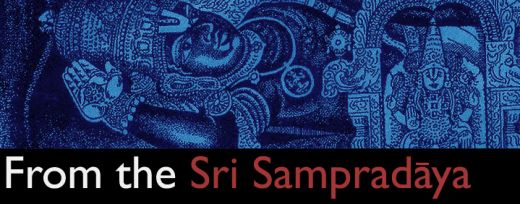
Sri Ramanuja, the great theistic Vedantin, provides a model of the relationship between the world and God which sees the world as God’s body. I thought we could explore that notion here.
In Bhagavad-gita 10.20 Krishna says
I am the self, Arjuna, dwelling in all beings.
In his commentary on this text Ramanuja suggests that a self relates to a body in three ways. First, it supports a body. The self is suporter (adhara), while the body is supported (adheya). Second, it controls a body. The self is controller (niyatri) while the body is controlled (niyamya). Finally, a self is the purpose-giving end which is served by a body. Here, the self is the principal (sheshin) and the body, the accessory (shesha).
Let’s consider these three relations in order. The first, between supporter and a supported thing, may be fairly evident already. In classical notions of reincarnation, a self is what supports the continued existence of a body as a unified, enduring substance. Should the self leave the body, the body would be left unsupported and slowly break down into more basic matter. Departing a bit from the obvious meaning of “support”, we may note that a self provides a body with a kind of holistic integrity. A body is composed of innumerable smaller components and sub-mechanisms. Yet, they all act in concert as an organic whole. This is due to the self’s supporting the body, informing the body such that its integrity remains.
I think that the controller/controlled relation is also fairly clear. The self is, so to speak, the master of the body. This mastery is limited much of the time. The control is often indirect and imprecise—much of the body’s function is beyond the willful control of the self. Nevertheless, the self often controls the body by means of volition. I choose to move my arm. I choose to exercise, etc.
The final relation, principal/accessory, is ambiguous because the Sanskrit terms involved do not admit of easy translation. The idea of a shesha, accessory is described by Ramanuja as follows:
The nature of an accessory (shesha) is to exist as having a use for something else. It exists to support the purposes of the principal (shesin) which transcends it. (Paraphrase from Vedartha-sagraha 121)
Given the above discussion, it seems fairly clear how the world may relate to God as a body relates to a self. Ramanuja quotes from a host of sacred texts to substantiate this idea, including Brihadaranyaka Upanishad 3.7.15.
This self of yours who is present within but is different from all beings, whom all beings do not know, whose body is all beings, and who controls all beings from within—he is the inner controller, the immortal. (Translation by Olivelle)[1. Patrick Olivelle, Upanishads, New York (Oxford University Press: 1996), 43.]
There are a number of interesting consequences to the notion of the world as God’s body. I will close by discussing one, which Ramanuja thinks central to his entire theological project. Commonly, he suggests, we refer to a self through a body. The terms which describe a particular being like a man or a god primarily denote the embodied self which is supports the body of the man, god, etc. If I say “she is a good person” while pointing to the woman in my office, Ramanuja would suggest that I am ultimately referring to the self which is the truest essence of the woman, by pointing to her body. In short, references to the self often take place by referring to the body. Ramanuja concludes that in the same way, the primary referent of all denotative language is God, whose existence supports and informs the existence of both matter and the individual selves which populate it. This conception of denotative language provides a powerful tool to understand and contemplate the Upanishadic teachings which indicate the presence of Brahman by indicating a feature of the world which participates in Brahman. As it is a kind of ignorance which allows us to think of and refer to bodies without considering the indwelling individual self, it is a similar kind of ignorance which allows us to refer to anything without cognizance of its dependence on the universal self.
Related Posts: The Yoga Chikitsa of Krishna’s Names